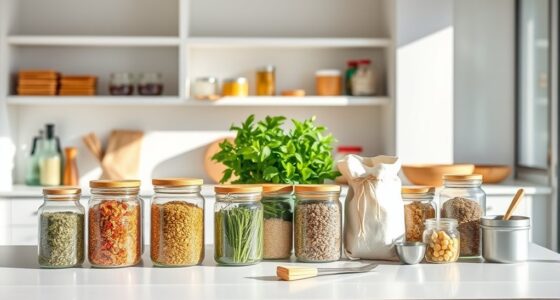To succeed in a no-trash week, prepare by organizing reusable containers, cloth bags, and bulk items. Rethink shopping by avoiding plastic packaging and seeking stores with minimal waste options. Use eco-friendly containers, compost food scraps, and embrace simple swaps like soap bars and reusable wipes. Expect challenges like store limitations, but stay resourceful—bring your jars, ask staff for alternatives, and stay committed. Keep going to discover how small actions can make a big impact.
Key Takeaways
- Plan ahead by preparing reusable containers, cloth bags, and bulk ingredients to minimize packaging waste throughout the week.
- Incorporate composting food scraps and vegetable juices to reduce trash and create nutrient-rich soil.
- Shop at bulk stores with minimal packaging, bringing your own jars and bags to avoid single-use plastics.
- Use reusable personal items like bamboo toothbrushes, cloth wipes, and solid soaps to eliminate disposable waste.
- Overcome challenges by asking store staff for reusable options, choosing minimal packaging, and repurposing existing containers.
Preparing for the Zero-Waste Week
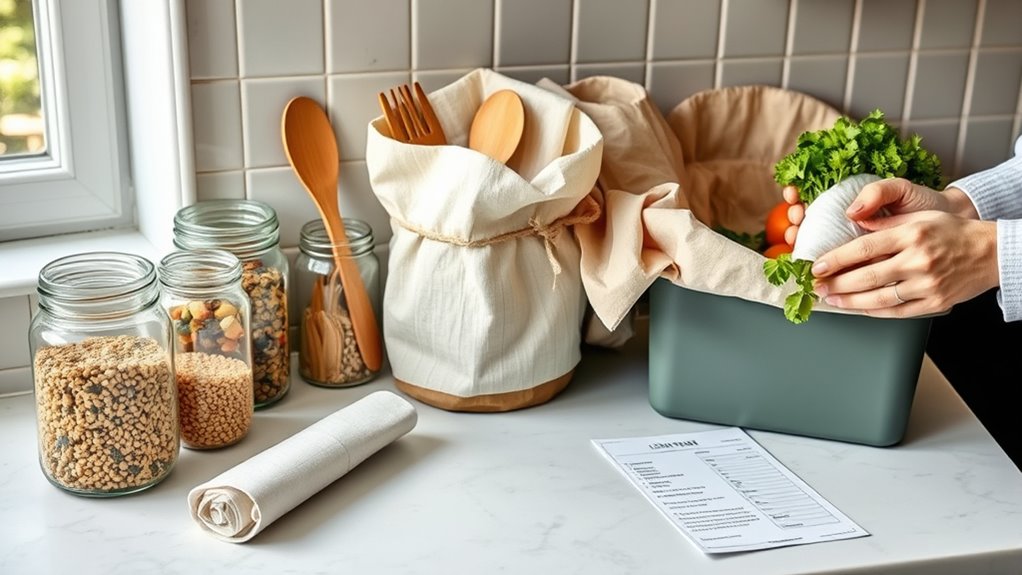
Are you ready to plunge into your zero-waste journey? Preparing for your zero-waste week starts with planning. Urban gardening is a great way to grow fresh produce without packaging waste, so consider setting up a small balcony or windowsill garden. Use composting techniques to turn food scraps into nutrient-rich soil, reducing trash and supporting your plants. Before your week begins, gather reusable containers, cloth bags, and zero-waste essentials like beeswax wraps. Stock up on bulk items to avoid packaging waste, and plan meals around local, package-free options. Incorporating vegetable juices into your diet can also help you utilize vegetable scraps and reduce waste further. By setting up your urban garden and mastering composting techniques, you’ll lay a solid foundation for reducing waste. Proper preparation guarantees you’re ready to minimize trash and embrace sustainable habits during your zero-waste week.
Rethinking Shopping and Packaging
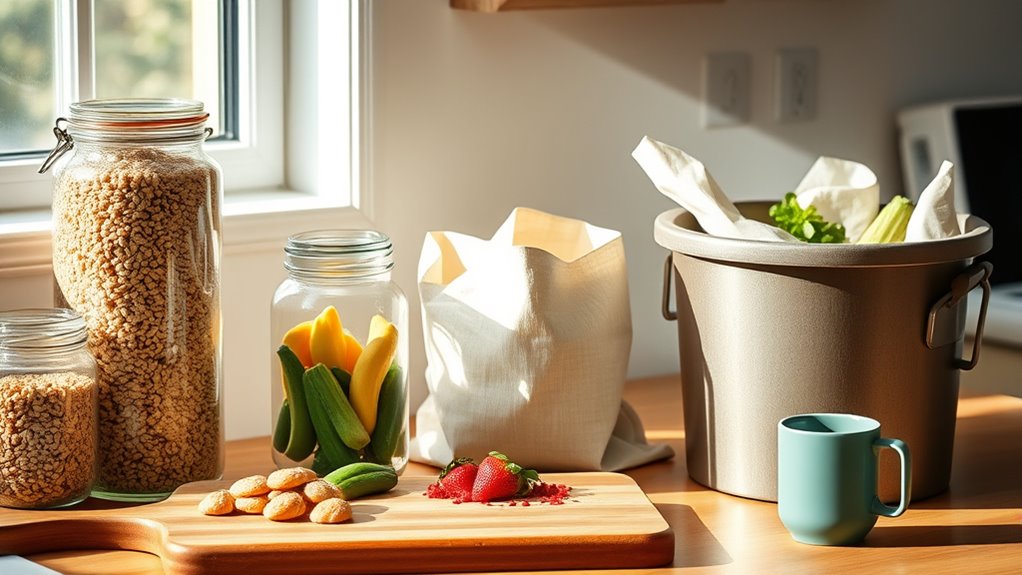
Rethinking how you shop and handle packaging is essential to reducing waste during your zero-waste journey. Instead of relying on single-use bags and packaging, focus on reusable shopping options like cloth bags, mesh produce bags, and containers that can be refilled. Look for stores that offer waste-free packaging or bulk sections, where you can bring your own jars and containers. This minimizes packaging waste and encourages more sustainable choices. When shopping, prioritize products with minimal or no packaging, and avoid items wrapped in plastic or unnecessary layers. By adopting reusable shopping habits and seeking out waste-free packaging options, you create less trash and support a more sustainable lifestyle. Small changes here can make a significant difference in reducing your overall waste footprint. Understanding pinball machine mechanics can also inspire creative ways to repurpose or repair items instead of discarding them.
Embracing Reusables and Zero-Waste Containers
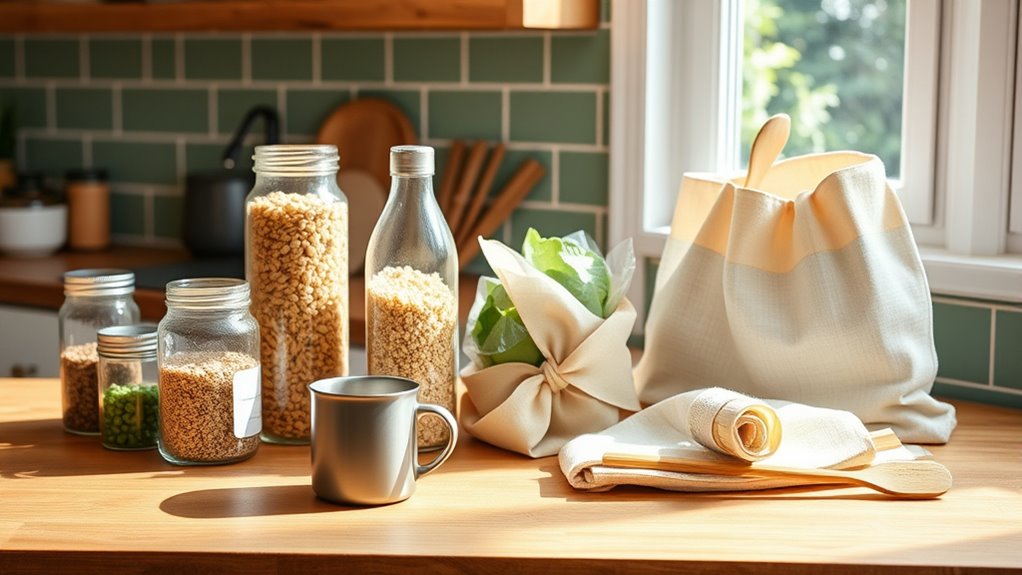
Switching to reusables and zero-waste containers is a practical step that complements your efforts to reduce packaging waste. By using glass jars, stainless steel bottles, and cloth produce bags, you minimize single-use plastics and waste. These containers are also great for sustainable gardening, allowing you to store seeds, compost, or plant cuttings without plastic packaging. Plus, they support eco-friendly laundry routines—using washable bags for detergent or reusable dryer balls reduces waste and harmful chemicals. Embracing these reusables makes your daily habits more eco-conscious and less dependent on disposable items. Incorporating sustainable storage solutions can further enhance your efforts to reduce waste. Over time, you’ll notice how simple swaps can considerably cut down trash, making your zero-waste journey more effective and sustainable. It’s a small change with a big impact.
Creative Solutions for Food Storage and Waste Reduction
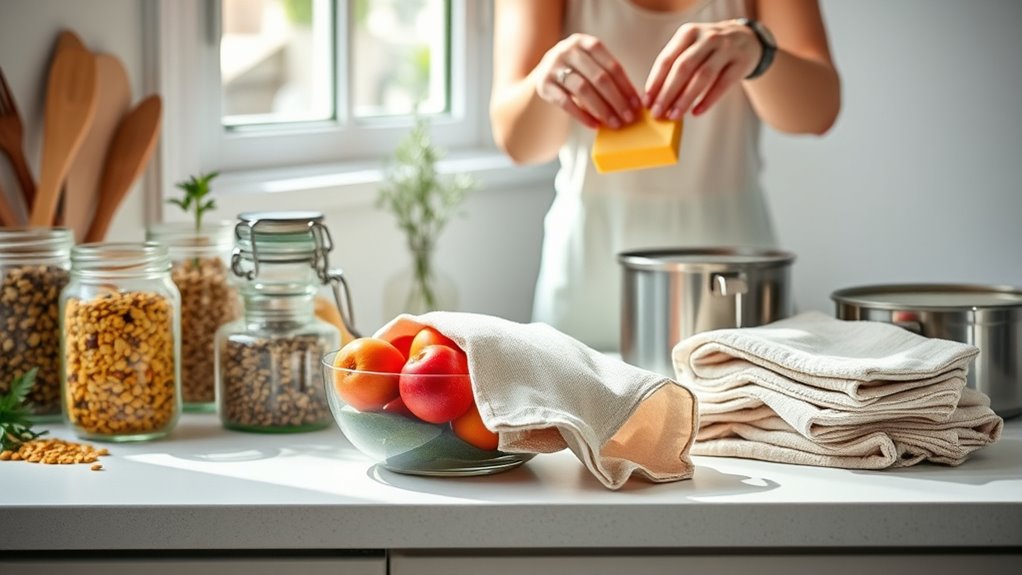
Using reusable containers and jars is a simple way to store food without waste. You can also save packaging by shopping in bulk, reducing excess waste. These creative solutions make it easier to keep your kitchen eco-friendly and organized.
Reusable Containers and Jars
Have you considered how reusable containers and jars can revolutionize your food storage? By choosing these eco-friendly alternatives, you reduce reliance on single-use plastics and cut down waste. Glass jars, stainless steel containers, and silicone wraps serve as sustainable packaging options that keep your food fresh and secure. They’re versatile for storing leftovers, snacks, or bulk items, eliminating the need for disposable bags and wrappers. Plus, these containers are durable, easy to clean, and often transparent, so you can quickly see what’s inside. Switching to reusable containers not only minimizes trash but also encourages mindful consumption. It’s a simple step toward a zero-waste lifestyle that benefits the environment and your household budget. Incorporating color accuracy into your storage solutions can help you better distinguish contents and keep track of freshness. Making this change is an effective way to embrace eco-friendly alternatives daily.
Bulk Buying and Packaging
Buying in bulk can considerably reduce packaging waste and save you money, especially when paired with creative storage solutions. By choosing bulk shopping, you minimize the need for single-use packaging and embrace sustainable packaging options. It’s empowering to see your efforts make a real impact on waste reduction. Incorporating aesthetic wall organization systems can further enhance your storage and decluttering efforts, making your space both functional and visually appealing. Imagine the satisfaction of:
- Filling your jars with fresh grains and spices, cutting down on plastic waste
- Using cloth bags or reusable containers for effortless bulk shopping
- Restocking your pantry without excess packaging, saving money and the environment
- Creating a streamlined, clutter-free space with minimal waste
Bulk buying encourages mindful consumption and helps you embrace a more sustainable lifestyle. With a little planning, you turn waste reduction into a rewarding, everyday habit.
Managing Personal Hygiene and Waste-Free Alternatives
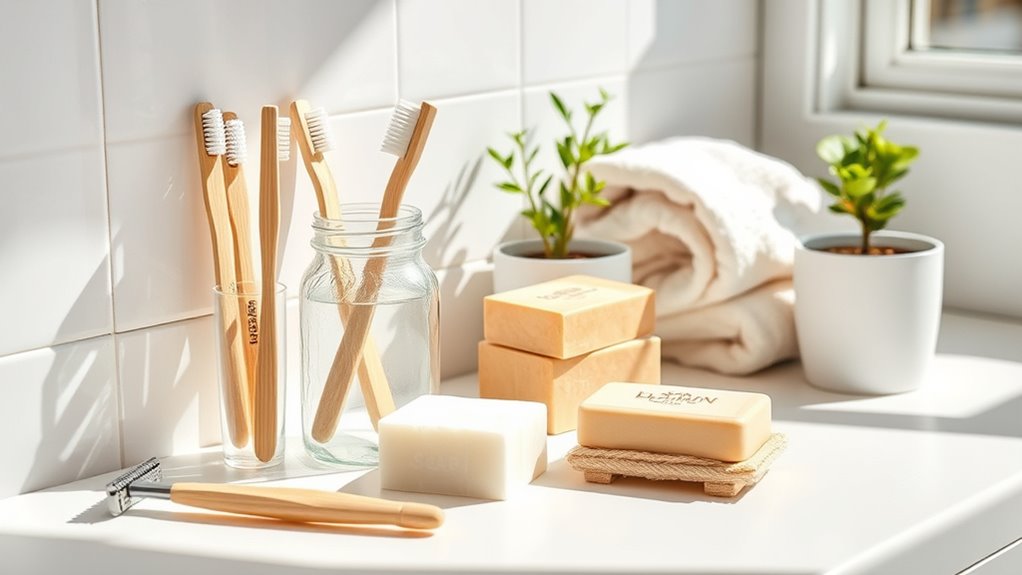
Managing personal hygiene without generating waste requires intentional choices and innovative alternatives. You can switch to waste-free options like bar soaps, reusable cloth wipes, or bamboo toothbrushes. These alternatives reduce packaging waste and minimize your environmental impact. To help visualize, here’s a simple comparison:
| Item | Waste-Free Alternative | Benefits |
|---|---|---|
| Shampoo | Solid shampoo bars | Long-lasting, zero plastic |
| Toothbrush | Bamboo toothbrush | Biodegradable, sustainable |
| Facial cleansing | Reusable cloth wipes | Fewer disposables, gentle care |
| Personal hygiene | Eco-friendly practices | Promote sustainability in daily routines |
Navigating Dining Out and On-the-Go Challenges

Finding your way through dining out and on-the-go situations can be tricky when aiming to maintain a zero-waste lifestyle, but with a few mindful strategies, you can minimize your environmental impact. Carry reusable utensils and containers to avoid single-use plastics and support local food vendors that offer minimal packaging. Seek out places with composting options to ensure food scraps are properly managed. When possible, choose restaurants that serve in-house or offer compostable takeout containers. Be prepared to politely decline unnecessary packaging or straws, making the experience seamless. Incorporating mindful decluttering strategies can help you organize your zero-waste supplies and essentials more efficiently.
Minimize waste by carrying reusable utensils, choosing compost-friendly places, and politely declining unnecessary packaging.
- Find eateries that prioritize local food, reducing carbon footprint
- Bring your own reusable cup for coffee or drinks
- Request no plastic utensils or napkins
- Support businesses committed to zero-waste practices, making a difference with every choice
Unexpected Obstacles and How I Overcame Them
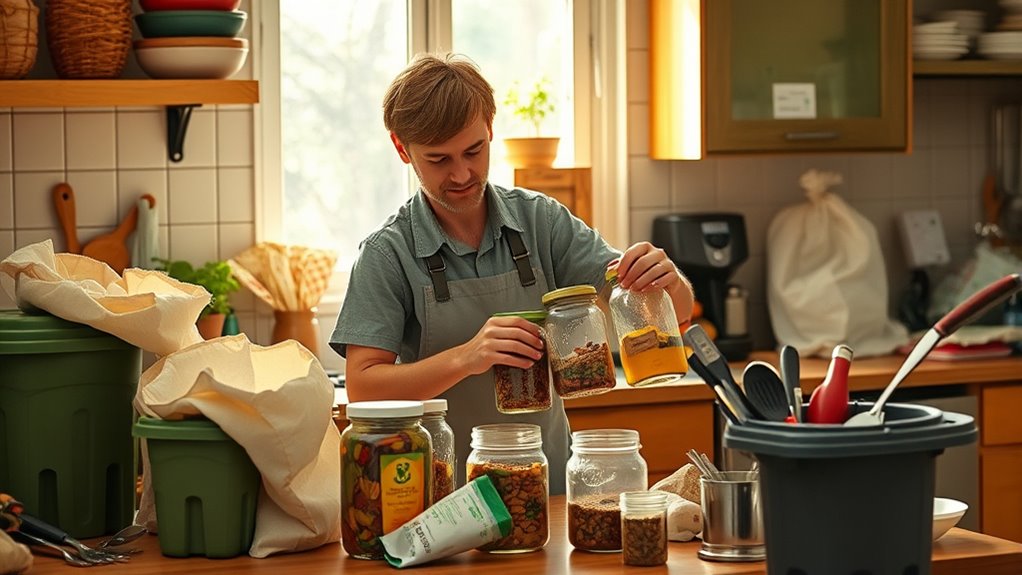
Grocery shopping can throw unexpected hurdles your way, especially when reusable options are limited. You might find yourself stuck without the right containers or bags, making waste reduction tricky. But with a bit of creativity and planning, you can find clever solutions to keep your zero-waste goals on track. Incorporating farmhouse-style accessories like vintage baskets or rustic crates can also help organize and carry bulk goods more sustainably.
Grocery Store Challenges
Have you ever faced unexpected obstacles while trying to stick to a zero-waste grocery shopping plan? One challenge is dealing with *plastic shopping* environments that make it hard to avoid waste. You might find yourself frustrated when stores don’t offer *eco friendly packaging* options.
- Finding bulk bins that actually carry your favorite staples
- Steering through stores that rely heavily on plastic packaging
- Dealing with employees unfamiliar with zero-waste practices
- Limited availability of sustainable alternatives in your area
These moments can feel discouraging, but you adapt. You bring your own containers, ask store staff about reusable options, and choose items with minimal or compostable packaging. Persistence pays off, and each small victory reinforces your commitment to waste-free shopping.
Limited Reusable Options
Limited reusable options can be a significant obstacle when trying to stick to a zero-waste routine, especially in areas where eco-friendly products are scarce. Without access to durable containers or cloth bags, you’re forced to rely on single-use plastics and packaging waste. This makes it challenging to avoid trash, as many stores still package produce or snacks in plastic wraps. To overcome this, you get creative—bringing your own jars, asking vendors to skip unnecessary packaging, or seeking out bulk stores with minimal packaging. Sometimes, you even negotiate for reusable options or repurpose containers you already have. While limited choices can feel frustrating, these small adjustments help reduce waste and keep you committed to your zero-waste goal. Additionally, understanding recycling and composting practices can further enhance your waste reduction efforts.
Reflecting on the Impact and Lessons Learned

Reflecting on your zero-waste journey reveals the true impact of your efforts and the lessons you’ve learned along the way. You’ve seen how reducing trash can positively affect the environment and spark behavioral change. This experience shows that small actions add up and can inspire others. You might feel proud of avoiding single-use plastics and making mindful choices, but also aware of the challenges.
Some key lessons include:
- Recognizing how personal habits influence larger environmental outcomes
- Understanding that change takes patience and persistence
- Realizing the importance of resourcefulness and creativity
- Appreciating the ripple effect of leading by example
Additionally, embracing sustainable habits can help you maintain momentum and deepen your positive impact. Your journey highlights that every effort counts and inspires ongoing commitment to sustainability.
Tips for Maintaining a Low-Waste Lifestyle Beyond the Challenge

Maintaining a low-waste lifestyle beyond your challenge requires ongoing commitment and intentional choices. First, be aware of zero waste myths that can discourage you, like the idea that perfection is necessary or that small efforts don’t matter. Instead, adopt a sustainability mindset, focusing on progress over perfection. Keep reusable items handy, like bags, bottles, and containers, to reduce reliance on disposables. Educate yourself about eco-friendly products and practices, and stay open to trying new tips. Establish routines that support your values, such as shopping at bulk stores or composting waste. Remember, consistency is key. Small, mindful actions add up over time, making sustainable living a natural part of your daily life.
Frequently Asked Questions
How Did the Challenge Affect My Daily Routines and Habits?
This challenge prompts behavioral shifts that change your daily routines markedly. You become more mindful about waste, opting for reusable items and avoiding single-use plastics. Social interactions might also shift as you explain your choices or encourage others to reduce waste. Overall, it’s about adopting sustainable habits that become second nature, making you more conscious of your environmental impact and inspiring those around you to contemplate their own habits.
What Unexpected Sources of Waste Did I Encounter?
You might be surprised to find waste from packaging surprises and household items you never considered. Even with your efforts, plastic wrappers from food or small items can slip through, creating unexpected trash. Packaging from online shopping or takeout often sneaks in, despite your best intentions. Household items like old batteries or broken gadgets also become waste sources you hadn’t anticipated, reminding you that zero waste requires constant vigilance.
How Did I Handle Personal Hygiene Without Traditional Products?
You handle personal hygiene by exploring natural alternatives and DIY recipes. Instead of conventional products, you use homemade deodorants with baking soda and coconut oil, and make your own toothpaste using baking soda and essential oils. For hair, you try apple cider vinegar rinses and baking soda washes. These natural options reduce waste, are eco-friendly, and keep you feeling fresh without relying on plastic packaging or commercial products.
What Tools or Skills Were Most Helpful During the Challenge?
During your zero-waste challenge, reusable containers and composting methods proved most helpful. Reusable containers let you store food without plastic waste, making your efforts sustainable. Composting methods enable you to efficiently recycle organic waste, reducing landfill contributions. Developing these skills and tools helps you stay organized and eco-friendly, ensuring you minimize trash and adopt a greener lifestyle. These practical solutions become essential for maintaining zero-waste habits long-term.
Did I Notice Any Changes in My Mental or Physical Well-Being?
You might notice improved mental clarity and reduced stress as you focus on mindful living and minimizing waste. Cutting down on clutter and unnecessary consumption can help clear your mind and bring a sense of calm. Physical well-being can also benefit from eco-friendly habits, like cooking fresh meals and spending time outdoors. These positive changes often lead to a more balanced, healthier mindset, making you feel more energized and centered.
Conclusion
By the end of your zero-waste week, you’ve woven a tapestry of mindful habits that transform trash into triumph. Every small choice, like a drop in the ocean, creates ripples of change. Remember, this journey isn’t about perfection but progress—each step is a seed planted for a more sustainable future. Keep nurturing these habits, and watch your efforts blossom into a lifestyle that champions the planet’s health, one mindful act at a time.





